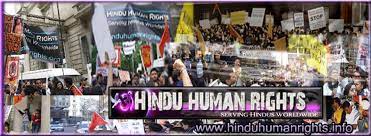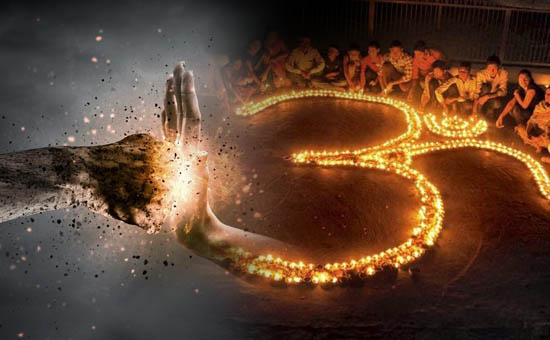HHR UK OZ NZ
“The pain of a Hindu anywhere is the pain of Hindus everywhere”. HHR Motto
Hindu Human Rights was set up in 2000 to highlight cases of persecution and defamation of indigenous Hindus and Hinduism around the globe.
The Bhagavad Gita says that we should share in the joys and sorrows of others as if they are our own. This empathic vision guides the concept of action taken to uphold Dharma.
Prejudice against Hindus for their cultural practices and beliefs, their faith and their customs spans at least eight centuries. Labelled by xenophobic othering as ‘non-believers’, ‘idolators’, ‘kaffirs’, ‘pagans’, ‘heathens’ and demonised by successive waves of colonising powers, the continuity between oppression of indigenous Hindus and those of other indigenous traditions carries into the prejudices of the enlightenment era with Eurocentric notions of ‘civilisation’ and attempts to ‘civilise the savages’.
Hinduphobia is defined by Oxford dictionary, Lexico, as Dislike of or prejudice against Hinduism or Hindus. The origins are 1866, not ‘late 19th C’.
Anti Hindu sentiment, or Hinduphobia, was first coined at least by 1866 and its first known use is by Sir Edward Sullivan speaking of James Mills’ prejudice against Hindus for denying the wealth of India prior to Islamic invaders.
Background
HHR UK

Hindu Human Rights UK (HHR) was formed because of the lack of an organisation to secure and protect the legitimate human rights of indigenous Hindus, both under international and national laws.
Hinduphobia continues to be ignored. Unfortunately, even in this age of fast communication, cosmopolitanism, globalisation and increasing international awareness and understanding of the importance of protection of indigenous cultures, human rights and systemic prejudices and biases, Hinduphobia has not been granted the attention of Human Rights groups, legislators, activists outside the Hindu community, or the United Nations.
The United Nations Charter of 1945 and the Universal Declaration of Human Rights in 1948 set standards for measuring accepted norms or human rights, securing the dignity of the individual, and advancing humanity and mutual tolerance.
Since that date, other similar conventions have been drafted, at international level and regionally, such as the European Community, Organisation of African Unity, and the Organisation of American States. Domestic jurisdictions have applied the principles of International Law, via interpretation through their own systems of justice.
It is precisely because such interpretation has followed a heavily subjective pattern, that flaws have arisen. State sovereignty is a fundamental principle of international law. Yet so are human rights. Situations are not uncommon when reconciling the two has been a major issue.
Yet they need not be mutually antagonistic, and the incredible success of the post-1945 political arena, particularly the functioning and even existence of the United Nations should not be overlooked.
There have been, are, and will continue to be effective procedures to rectify breaches of human rights. Mechanisms for airing, deciding, and honouring cases of human rights do exist. The International Court of Justice and its organs provide a universally accepted arena to implement the procedures which academic theory has formulated.
Nevertheless, because no enforcing powers exist, or at best are rarely used, human rights remains dependent on national jurisdiction. This is fine where implementation follows the spirit of the original Universal Declaration. But in many cases, this is not done.
It is for this reason that autonomous bodies and Non-Governmental Organisations exist, and act as unofficial ombudsman, highlighting areas where actual practice either ignores or falls short of accepted standards.
HHR regards itself as such an organisation. There are many situations where individuals have lesser or even an absence of human rights because they are Hindus one of the largest indigenous people in the world. Their rights are infringed or abrogated because they are Hindus.
Hindus inalienable human rights are ignored, making the Hindus very much alienated. This can even take more subtle forms, such as assaults in the print and electronic media.
While this may not seem serious at the outset, it does provide the theoretical foundation which can, and in most cases does, precipitate acts of severe Hinduphobia, with all the human rights abuses that it brings. This includes persecution on a racial basis, or denial of freedom of conscience because the victim concerned, is an indigenous Hindu.
At the same time HHR believes in the fundamental principles of international human rights as applied to all. It is in the spirit of Hindu Dharma, Hindu belief and action, that all are accorded with equity and respect, and that rights are not infringed. Indeed Hindus go further and accord respect to all forms of life.
HHR therefore sees present standards of international human rights as a medium which can constantly be improved upon, modernised and reinterpreted. It is an area where largely untapped the repository of knowledge known as Hindu Dharma, can be utilised in working towards global and cultural understanding.

